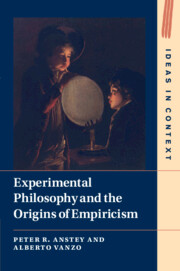Book contents
- Experimental Philosophy and the Origins of Empiricism
- Ideas In Context
- Experimental Philosophy and the Origins of Empiricism
- Copyright page
- Contents
- Figures
- Tables
- Acknowledgements
- A Note on Citations
- Abbreviations
- Introduction
- Part I The Rise of Experimental Philosophy
- Chapter 1 The Origins of the Experimental/Speculative Distinction
- Chapter 2 Experimental Philosophy in the Seventeenth Century
- Chapter 3 Experimental Natural History
- Part II The Heyday of Experimental Philosophy
- Part III From Experimental Philosophy to Empiricism
- Conclusion
- Manuscripts Cited
- Newspapers, Broadsheets, and Almanacs
- References
- Index
Chapter 1 - The Origins of the Experimental/Speculative Distinction
from Part I - The Rise of Experimental Philosophy
Published online by Cambridge University Press: 17 February 2023
- Experimental Philosophy and the Origins of Empiricism
- Ideas In Context
- Experimental Philosophy and the Origins of Empiricism
- Copyright page
- Contents
- Figures
- Tables
- Acknowledgements
- A Note on Citations
- Abbreviations
- Introduction
- Part I The Rise of Experimental Philosophy
- Chapter 1 The Origins of the Experimental/Speculative Distinction
- Chapter 2 Experimental Philosophy in the Seventeenth Century
- Chapter 3 Experimental Natural History
- Part II The Heyday of Experimental Philosophy
- Part III From Experimental Philosophy to Empiricism
- Conclusion
- Manuscripts Cited
- Newspapers, Broadsheets, and Almanacs
- References
- Index
Summary
This chapter discusses the historical origins and emergence of the distinction between experimental philosophy and speculative philosophy. It opens with a summary of certain disciplinary-specific shifts in the late Renaissance that led to an increased appreciation of the value of experiment and observation. It then turns to the crucial traditional distinction between speculative and practical knowledge, which can be traced all the way back to Aristotle and was central to medieval and Renaissance understandings of the disciplines. Traditionally, natural philosophy had been classed as a speculative science, but interesting new approaches can be found in Roger Bacon, in the practice of natural magic, and in mechanics. These developments paved the way for the emergence of Francis Bacon’s division of natural philosophy as having a speculative and a practical, or operative, side. Francis Bacon’s heirs were to embrace his emphasis on the role of experiment in the operative side of natural philosophy, and by the 1660s in England a new form of operative natural philosophy emerged that its practitioners and advocates called experimental philosophy. In many contexts, it was set against the older, speculative approach to natural philosophy.
Keywords
- Type
- Chapter
- Information
- Experimental Philosophy and the Origins of Empiricism , pp. 19 - 42Publisher: Cambridge University PressPrint publication year: 2023

